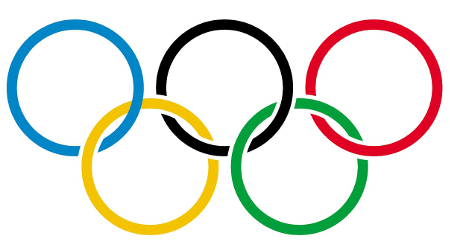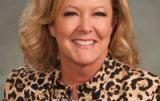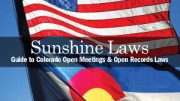By Jeffrey A. Roberts
CFOIC Executive Director
Since it was formed last December, the big-name panel exploring a potential Denver bid to host the Winter Olympic Games has met mostly behind closed doors. Its metro and mountain community meetings have been open to the public, but not the meetings of the full committee that will make a recommendation nor its subcommittees.
The city says the Denver Olympic and Paralympic Winter Games Exploratory Committee, formed by Mayor Michael Hancock, is not a public body bound by the Colorado Open Meetings Law and, therefore, it can meet however it sees fit.
But there is a solid legal argument that the state’s open meetings law, also known as the Sunshine Law, indeed does apply to the Winter Olympics exploratory committee. And if that’s the case, the public should be notified of all meetings and the committee should bar the public from attending only under the limited circumstances allowed by the law.

“The Winter Games Exploratory Committee is subject to and should comply with the Colorado Open Meetings Law,” said Marc Flink, an attorney with BakerHostetler who formerly represented the Rocky Mountain News on open records and open meetings matters. “In part because the committee, comprised of individuals with statewide business and governmental interests, was assembled by and is acting in an advisory role to the mayor of Denver and the governor of Colorado on whether Denver should submit a bid – a matter of significant statewide concern – its meetings and deliberations should not be conducted in secret.”
With Flink’s help, the Colorado Freedom of Information Coalition has been asking questions about the exploratory committee since The Denver Post reported in January that its discussions were being held in private.
“The exploratory committee is committed to being as transparent as possible throughout this process,” Ramonna Robinson, the committee’s spokesperson, wrote in an email to CFOIC. “The exploratory committee’s work needs to be conducted in private sessions because they discuss proprietary information that could be essential to a bid in the future.”
Is there a legal basis for that explanation? What about language in the Sunshine Law that includes “advisory” boards and committees in the definition of a local public body covered by the law, as well as a “formally constituted body of any political subdivision of the state” and “any public or private entity to which a political subdivision, or any official thereof, has delegated a governmental decision-making function?”
It’s clear that Hancock formed the committee. A Dec. 15, 2017, email from the mayor’s deputy communications director, Jenna Espinoza, says that Hancock, “with the support of Colorado Governor John Hickenlooper, has assembled a group of civic and community leaders from around the State of Colorado to determine whether Denver should submit a bid” for the Olympics.
A news release issued that day by Robinson also says that Hancock “assembled” the group and that its findings will be presented to the mayor and governor.
In an email to Assistant City Attorney Jessica Brody, Flink quoted from the Colorado Open Meetings Law, which declares that “the formation of public policy is public business and may not be conducted in secret.”
“There can be no question that the Committee’s consideration and advice to the Mayor and Governor whether Denver and Colorado should submit a bid to host a future winter Olympics, a matter that was put to vote of the citizens of Colorado in the 1970s, is the consideration of public policy and public business which ‘may not be conducted in secret’ and ‘should be conducted in public,’” Flink wrote.
Brody’s responses to questions posed by Flink and CFOIC have been terse. In one email, she wrote only that the committee “is not subject to open meeting requirements.” Asked to elaborate, Brody wrote that Denver has adopted its own open meetings law, codified in Chapter 2, Article III of the Denver Revised Municipal Code, which includes its own definition of a “public body.”
That definition is a long list of boards and commissions the city considers to be subject to open meeting requirements. Not surprisingly, the Winter Olympics exploratory committee isn’t on the list.
Does that mean Denver can designate which boards and committees are open to the public – and by omission, which are not – simply by preparing a list? Does Denver contend that its open meetings ordinance supersedes the state’s Sunshine Law?
“Please let me know if the City is taking the position that meetings by public bodies assembled to discuss important policy issues and public business can be shielded from public observance merely by not listing the public body” in the municipal code, Flink asked Brody in an email. He also noted that open meetings are declared to be “a matter of statewide concern” in the state law and that the Olympics committee is surely “dealing with matters of statewide business, policy and concern.”
Responding to Flink, Brody wrote that she disagrees with his legal conclusions, reiterating that the committee is not a public body subject to Denver’s open meetings requirements and adding that it wouldn’t be a public body under the state law, either. But she provided no further explanation or analysis.
Flink, in a statement to CFOIC, said the Colorado Open Meetings Law “takes precedence over any conflicting city charters and ordinances.” When state lawmakers amended the law in 1991, he added, they applied it to “any board, committee, commission, authority, or other advisory, policy-making, rule-making, or formally constituted body of any political subdivision of the state.” And that includes “public bodies created by home rule cities such as Denver.”
The exploratory committee is chaired by Robert Cohen, CEO of The IMA Financial Group, and includes several notable members, including two former Denver mayors, former NBA star Chauncey Billups and former Denver Broncos quarterback Peyton Manning.
Robinson said four “Sharing the Gold” community advisory meetings were held in Denver and six such meetings were held in mountain communities. All were open to the public and news media, and the committee collected public input through online meetings and an online survey. But meetings of the committee and its subcommittees have not been open.
Christine O’Connor, a Denver resident who has tried to closely monitor the committee’s activities, said the exploratory process should be more transparent. There “should be a very public discussion by the citizens of Denver and Colorado as to whether our local and state resources and public funds should be used to explore this possibility, prepare a bid or host the games,” O’Connor wrote in an email to CFOIC.
“There will, without doubt, be some risk undertaken by our municipal and/or state legislative bodies if we move forward. I believe that this discussion should have been undertaken publicly by City Council members and town commissioners, rather than by appointees meeting out of the public eye. Isn’t this the reason we have elected leaders – to study proposed policy, hold hearings, weigh pros and cons and do so in plain view?”
If meetings of the exploratory committee were conducted in accordance with the Sunshine Law, the panel would be allowed to meet in closed-door executive sessions under certain circumstances. It could, for instance, bar the public from portions of meetings held to discuss documents “protected by the mandatory nondisclosure provisions” of the Colorado Open Records Act.
Those provisions of CORA include trade secrets, privileged information and confidential commercial data, if that’s the type of “proprietary information” the committee is trying to protect.
Robinson said the exploratory committee expects to finalize its recommendation later this month or in early May. The recommendation will be presented to Hancock and Hickenlooper in May.
Follow the Colorado Freedom of Information Coalition on Twitter @CoFOIC. Like CFOIC’s Facebook page. Do you appreciate the information and resources provided by CFOIC? Please consider making a tax-deductible donation.




